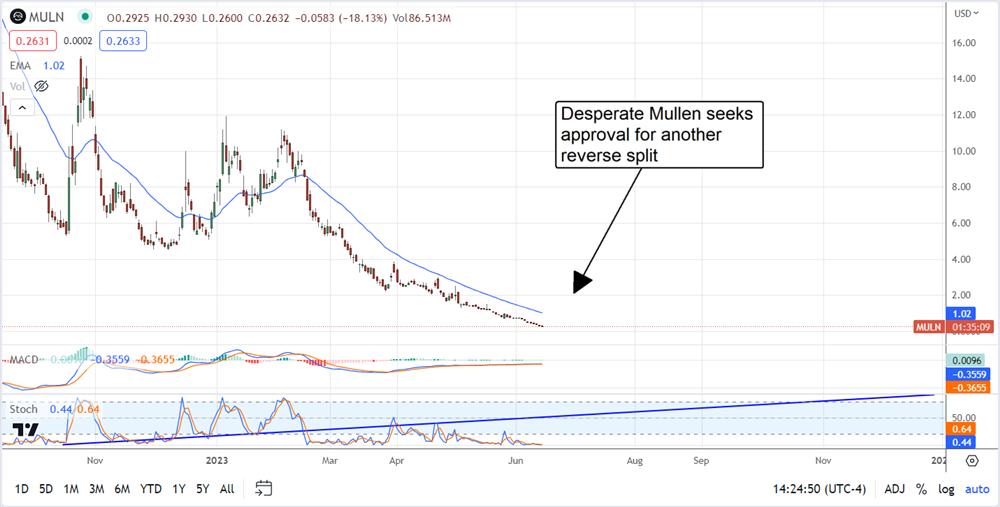
Shares of Mullen Automotive (NASDAQ: MULN) are down another 15% to trade back at the pre-split level near $.25. That’s a bitter pill to swallow for investors holding out hopes this company can defy the odds and pull off production, sales, revenue, and earnings. There are many reasons to hope. The company has issued a string of upbeat, almost too-good-to-be-true developments but has yet to produce a vehicle.
CEO David Michery says the company is on track to begin production in July and deliveries in August, which, if true, should be a catalyst for higher share prices. The problem is cash. It takes billions to get an EV production line underway and ramping to commercial scale, and Mullen is a million-dollar company. The last report didn’t reveal much cash on the books, there hasn’t been a significant amount gained since, and cash burn remains high.
Mullen Wants To Reverse Split: Again
Mullen Automotive’s latest SEC filing isn’t one to inspire hope. The company seeks shareholder approval for a reverse split to dilute shareholder value further. The split is smaller than the last, 1-for-2 up to 1-for-10, but no less harmful to shareholders. The intention is to get the share price back above $1 for NASDAQ Compliance, the same as last time, but the last time didn’t work. Shares are down.
The market could have supported the action without the additional dilution of exercised warrants and additional pre-funded warrants issued to early investors to settle a dispute. The takeaway is that Mullen is also seeking approval for an additional $52 million in shares for similar purposes; funding warrants. With this in mind, investors must ask themselves if the risk is worth it. Shares of MULN are down 81% since the May 4th, 2023, 1-for-25 reverse split; how far will they fall after another?
The institutional activity increased significantly following the last split, raising another specter. At first glance, buys from JPMorgan Chase, State Street, Deutsche Bank and others may look like solid support for the market, but the burst was short-lived. The institutions only own about 6% of the stock and may have bought the shares to lend out for shorting. The cost-to-borrow for MULN shares trends high due to its highly-shortable nature, offering easy money to savvy institutions, and the number of shares available to short is seemingly unending.
Can Mullen Pull It Off?
It looks like Mullen is racing toward a cash cliff. It has the infrastructure to produce the class-3 trucks and orders for the trucks; the question is if it has the capital to grease the wheels and keep the machine moving. Orders from the Randy Marion Group in NC could provide a stable source of cash for the company if established. In addition, the I-Go is in Europe and is another potential source of revenue, and other potential deals could emerge (Menzies, to name 1). The next few weeks to 2 months could produce another round of news that includes the company’s first revenue. With the short interest over 16%, the stage is set (still) for a squeeze. But that may be wishful thinking.
The chart isn’t promising. The only thing that can be said positively is that it is so oversold that any spark could ignite a rally. Mullen comes with many risks, but it isn’t dead yet. The only questions are when the company will release the next news, what that news will be, and if it will move the market anywhere but down.





